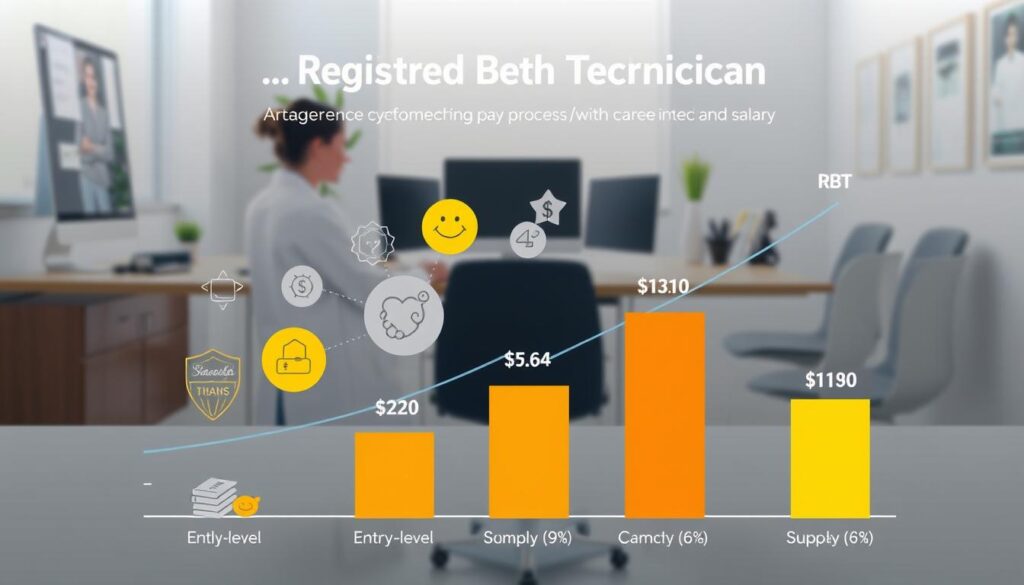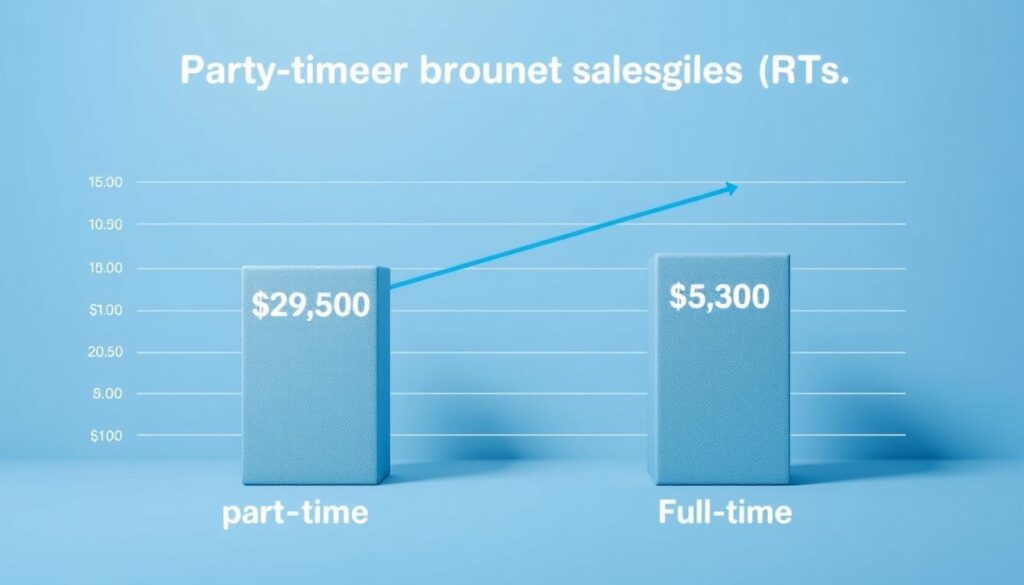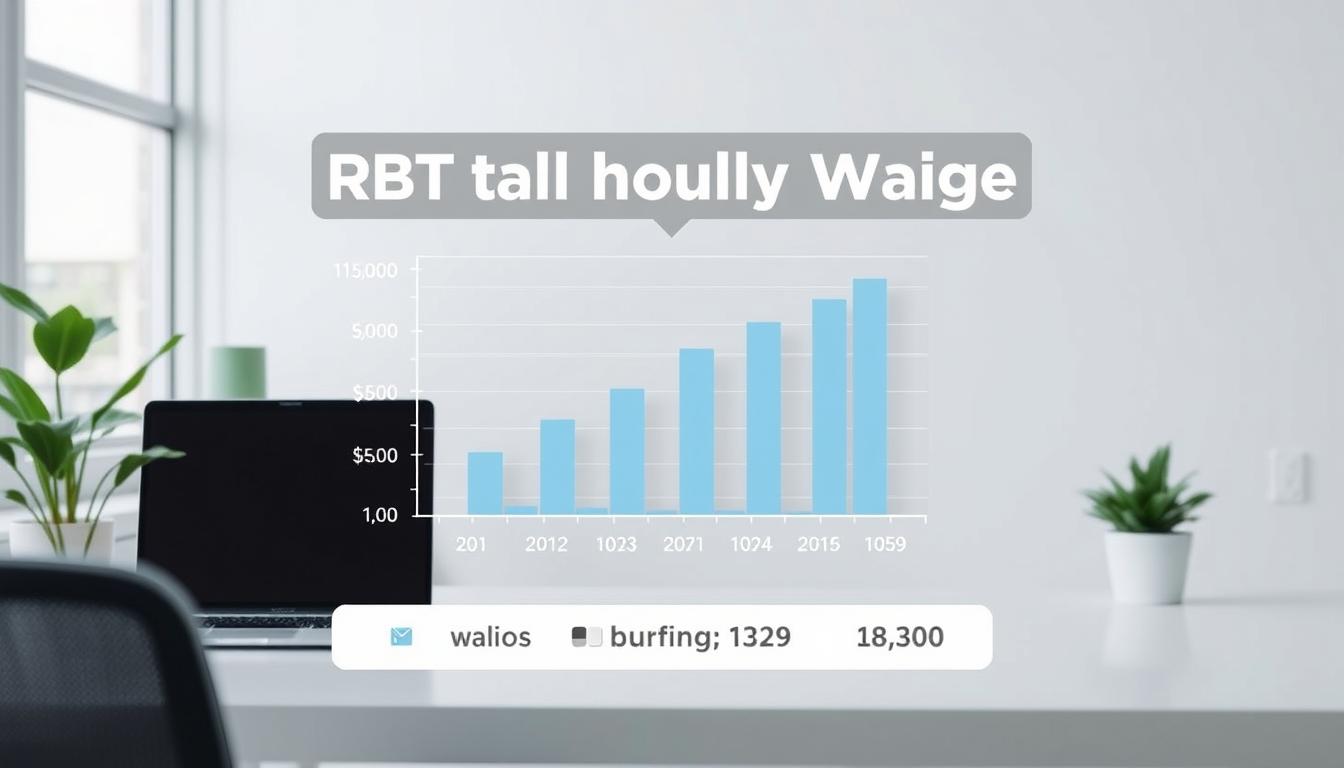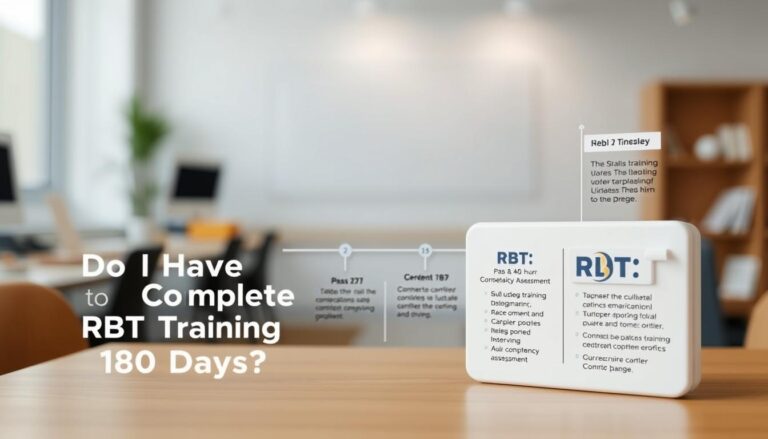The Typical Hourly Pay for a Registered Behavior Technician (RBT)
Knowing how much a Registered Behavior Technician (RBT) makes an hour is key for those starting in autism treatment. RBTs are essential in helping people with developmental issues. Their pay shows the value of their skills in this important work.
When looking at RBT hourly wages, several things matter. The pay is between $16 to $25 an hour. This depends on experience, where you work, and your location. RBTs are paid well for their important role in behavioral health.
This guide will cover all about RBT pay. We’ll look at starting salaries and what more experienced RBTs can earn. It’s for those thinking about this career and those already in it, to understand their earning possibilities and growth chances.
We’ll examine the RBT hourly wage from different angles. This will give you a clear picture of what affects their pay. If you’re thinking about this career or want to know about pay rates, this article is for you. It’s useful for anyone in healthcare or interested in behavioral therapy.
Understanding the Role of a Registered Behavior Technician
Registered Behavior Technicians (RBTs) are key in helping people with behavioral challenges, like autism. They work with certified analysts to use important strategies. These help improve the quality of life for their clients.
Core Responsibilities and Duties
RBTs have many important tasks that help their clients. Their main jobs include:
- Implementing behavior reduction plans
- Collecting data on client interactions
- Providing direct behavioral intervention
- Supporting skill acquisition programs
- Maintaining clear communication with supervisors
Required Certifications and Qualifications
To be an RBT, one must meet certain requirements. These affect their salary. The process includes:
- High school diploma or equivalent
- 40-hour training program completion
- Passing a criminal background check
- Successful completion of the RBT competency assessment
- Passing the official RBT certification exam
Work Settings and Environment
RBTs work in different places, which can affect their pay. These settings include:
| Work Setting | Typical Client Population |
|---|---|
| Schools | Children with developmental disabilities |
| Clinics | Individuals across age ranges |
| Home-based services | Families seeking personalized interventions |
| Residential facilities | Adults with complex behavioral needs |
People in this field need exceptional patience, good communication, and a real desire to help. They aim to teach important life skills.
Current National Average RBT Pay Rates
Knowing the average RBT earnings is key for those starting in this field. Registered Behavior Technicians help people with behavioral issues. Their pay shows the value of their skills in healthcare.
RBT pay varies by location and experience. Recent data sheds light on what these professionals usually earn.
| Experience Level | Hourly Rate Range | Annual Equivalent |
|---|---|---|
| Entry-Level RBT | $16 – $20 | $33,280 – $41,600 |
| Mid-Level RBT | $20 – $25 | $41,600 – $52,000 |
| Experienced RBT | $25 – $30 | $52,000 – $62,400 |
Several factors affect RBT pay:
- Geographic location
- Certification level
- Work setting
- Additional specialized skills
Professional tip: While hourly rates are a starting point, many RBTs value benefits and career growth too.
The need for skilled RBTs is rising, thanks to more support for autism and behavioral health. This means good job prospects for newcomers.
How Much Does a RBT Make an Hour: Complete Breakdown
Knowing how much a Registered Behavior Technician (RBT) makes an hour is key for those starting in behavioral health. The pay varies by experience, location, and where they work.
Looking into RBT hourly pay, you’ll find different rates. These rates reflect a person’s skills and experience.
Entry-Level RBT Hourly Rates
New RBTs start with good wages. This starting pay is a great beginning for those in behavioral health.
- Starting hourly rate: $15 – $18 per hour
- Average annual earnings: $30,000 – $35,000
- Potential for rapid wage increases with experience
Experienced RBT Pay Scales
More experienced RBTs earn more. Professional development is key to salary growth.
| Experience Level | Hourly Rate | Annual Earnings |
|---|---|---|
| 1-2 Years | $18 – $22 | $35,000 – $42,000 |
| 3-5 Years | $22 – $26 | $42,000 – $50,000 |
Regional Pay Variations
RBT pay varies by location. Cities usually pay more than rural areas.
- Metropolitan areas: Higher hourly rates
- Rural locations: Slightly lower compensation
- State-specific variations impact overall earnings
To earn more, consider extra certifications and training. This boosts your value in the job market.
Factors Affecting RBT Hourly Wages
It’s important to know what affects RBT wages per hour. This knowledge helps professionals in the behavioral health field grow their careers and earn more. Several key factors influence an RBT’s hourly wage.
Educational background is a big factor in RBT wages. Those with advanced degrees or specialized training often earn more. Here are some factors that affect wages:
- Level of education
- Professional certifications
- Years of experience
- Specialized skills
- Work performance
Certifications beyond the basic Registered Behavior Technician credential can increase earnings. Specialized training in areas like autism spectrum disorders or applied behavior analysis makes an RBT more valuable.
| Factor | Impact on RBT Wages |
|---|---|
| Bachelor’s Degree | 5-10% wage increase |
| Advanced Certifications | 8-15% possible boost |
| Years of Experience | 3-7% annual increase |
Job performance greatly affects RBT wages per hour. Employers look at client progress, documentation quality, and professional conduct. RBTs who perform well can ask for higher pay.
To increase RBT hourly wage, focus on continuous learning. Get more certifications and show off your skills in behavioral intervention techniques.
Geographic Location Impact on RBT Compensation
The hourly pay for a registered behavior technician changes a lot across the United States. Where you work greatly affects how much you earn. Many things influence how much RBTs get paid.
To understand RBT pay, we need to look at regional differences. We also need to consider urban vs rural areas and how living costs change.
Urban vs Rural Pay Differences
RBT pay rates change a lot between cities and rural areas. Cities usually pay more because:
- There’s more need for behavioral health services
- Living costs are higher
- There’s better healthcare infrastructure
- The job market is more competitive
Rural areas might pay less but offer lower living costs. They also might have more stable work environments.
State-by-State Comparison
RBT pay rates differ a lot from state to state. What affects pay in each state includes:
- Local healthcare rules
- State funding for behavioral health
- Population demographics
- Regional economic conditions
Cost of Living Adjustments
When looking at RBT pay, we must think about living costs. A $20 hourly rate in rural Texas might be more comfortable than a $25 rate in urban California.
RBTs should research local markets and look at total compensation. It’s not just the hourly rate that matters.
Experience-Based Pay Structure for RBTs

The salary for registered behavior technicians (RBTs) grows as they gain experience and skills. New RBTs start with a certain hourly rate. But, by improving their skills, they can earn more.
RBTs move up in their careers by learning and growing. At first, they earn based on their basic certification. But, as they learn more, they can earn more.
- First Year (0-12 months): Foundational skills development
- Years 2-3: Specialized intervention techniques
- Years 4-5: Advanced behavioral intervention strategies
Experienced RBTs can increase their salary by:
- Getting more certifications
- Learning advanced behavioral techniques
- Working with complex behavioral disorders
- Developing supervisory skills
Those who keep learning and achieve great results can see big salary increases. Employers look for RBTs who are dedicated to their growth and provide excellent services.
The best RBTs see their career as a journey of learning and growth. By always looking to improve and develop new skills, they can build a rewarding career with better pay.
Benefits and Additional Compensation
Registered Behavior Technicians (RBTs) get more than just their hourly pay. They enjoy a range of benefits that make their job rewarding. These perks are key to attracting and keeping skilled professionals in the field.
Looking at RBT earnings, it’s important to see the whole picture. Employers offer great benefits that add a lot of value to what RBTs earn.
Healthcare Benefits
Healthcare is a big part of what RBTs get. Most jobs come with medical, dental, and vision insurance. This includes:
- Full medical coverage with low deductibles
- Preventative care options
- Mental health support services
- Prescription medication coverage
Retirement Plans
Retirement planning is also a big deal for RBTs. Many jobs offer:
- 401(k) matching programs
- Employer-sponsored retirement savings plans
- Investment advisory services
- Potential profit-sharing opportunities
Professional Development Opportunities
Helping RBTs grow in their careers is important. Employers support this with:
- Continuing education credits
- Workshop and conference sponsorships
- Advanced certification support
- Mentorship programs
These extra benefits show how much employers value their RBTs. It’s not just about the money. It’s about helping them grow and succeed in their careers.
Career Advancement and Salary Growth
Registered Behavior Technicians (RBTs) have exciting career paths. These paths can greatly increase their RBT salary per hour. Professional growth offers many chances to earn more and improve skills.
Career advancement for RBTs follows several key routes:
- Becoming a Board Certified Behavior Analyst (BCBA)
- Specializing in specific autism intervention techniques
- Pursuing advanced clinical certifications
- Transitioning into supervisory roles
When thinking about how much an RBT makes an hour, it’s important to know. More certifications and experience can greatly increase earnings. Most RBTs start with lower wages but can quickly earn more through professional development.
Key strategies for salary growth include:
- Continuous education and training
- Gaining specialized behavioral intervention skills
- Building a strong professional network
- Seeking mentorship from experienced BCBAs
Ambitious RBTs can potentially double their initial salary within 3-5 years. This is by strategically advancing their professional credentials and expertise.
The healthcare and behavioral intervention fields are growing. This creates many opportunities for RBTs who invest in their growth and develop advanced skills.
Part-Time vs Full-Time RBT Pay Comparison

Registered Behavior Technicians (RBTs) have to decide between part-time and full-time jobs. Knowing how RBTs are paid can help them make better choices.
Hourly Rate Differences
The pay for RBTs changes a lot between part-time and full-time jobs. Full-time RBTs usually get more stable pay and extra benefits:
- Full-time RBTs often get higher base hourly rates
- Part-time jobs might offer flexible pay
- The chance for performance-based bonuses varies by job type
Schedule Flexibility Impact
Work schedules are key to RBT pay. Part-time jobs offer special perks:
- More flexibility in scheduling
- Chance to work multiple jobs
- Balance personal life easier
Full-time RBTs get better pay packages, like health benefits and steady income. The choice between part-time and full-time depends on career goals and personal life.
When picking a job, RBTs should think about pay, work-life balance, career growth, and money needs. This helps them choose the best job for them.
Industry Setting Impact on RBT Wages
The salary for registered behavior technicians (RBTs) changes a lot based on where they work. The setting of their job greatly affects how much they earn. Knowing this can help both new and experienced RBTs make better choices about their careers.
Here’s how different places to work affect RBT pay:
- School-Based Settings
- Usually have set hourly rates
- May offer health insurance and other benefits
- Can have limited hours, depending on the season
- Clinical Environments
- More likely to have steady, full-time work
- Salaries for RBTs can be higher here
- Good chances for growing professionally
- Home-Based Services
- Flexibility in scheduling
- Pay can vary
- Travel costs might affect earnings
Here’s a quick look at what RBTs can earn in different places:
| Work Setting | Average Hourly Rate | Additional Benefits |
|---|---|---|
| School-Based | $18 – $22 | Health Insurance, Paid Breaks |
| Clinical Environment | $20 – $25 | Professional Training, Bonuses |
| Home-Based Services | $17 – $23 | Mileage Reimbursement |
When thinking about their career, RBTs should look at more than just pay. Job stability, chances for growth, and personal interests are also important. These factors help make a decision that’s right for them.
Overtime and Holiday Pay Considerations
Registered Behavior Technicians (RBTs) often face unique pay structures. These go beyond just hourly wages. Knowing how overtime and holiday pay work can greatly affect their earnings.
RBTs earn differently during special times. Most employers have clear rules for extra pay:
- Overtime rates usually range from 1.5x to 2x the base hourly rate
- Holiday pay often includes extra money
- Healthcare settings might have different pay models
Special Rate Calculations
Overtime for RBTs varies by work place. Healthcare and behavioral therapy centers follow these main rules:
- Hours over 40 a week get overtime pay
- Weekend and night shifts may get extra pay
- Overtime must be okayed by supervisors first
Peak Season Opportunities
Some times offer more money for RBTs. Seasonal demand in behavioral health can lead to good overtime chances, like:
- Back-to-school times
- Summer programs
- Annual check-up periods
RBTs can earn more by knowing these pay rules. They can plan their work better to get more pay.
Negotiating Your RBT Hourly Rate

Negotiating your RBT salary per hour needs careful planning and confidence. Registered Behavior Technicians help people with behavioral challenges. Knowing how to ask for fair pay is key.
To figure out how much an RBT makes an hour, use these strategies:
- Research current market rates for RBT salary per hour in your specific region
- Document your professional achievements and specialized skills
- Understand your value beyond basic certification
- Prepare a compelling case for your desired compensation
Preparation is the cornerstone of successful salary negotiations. Before talking about pay, collect data on RBT hourly rates in your area. Local healthcare job markets affect pay a lot.
| Negotiation Strategy | Key Considerations |
|---|---|
| Market Research | Compare local RBT salary rates across different employers |
| Skill Demonstration | Highlight advanced certifications and specialized training |
| Professional Experience | Emphasize years of practice and successful client outcomes |
When talking about your RBT hourly rate, be professional. Practice your pitch, stay confident, and show your unique value. Remember, negotiation is about finding a good deal for both sides.
Good RBTs know their skills help clients. By sharing your skills and dedication, you can get a fair hourly rate that shows your worth.
Comparing RBT Pay to Similar Healthcare Roles
To understand RBT earnings, we must look at other healthcare jobs. Registered Behavior Technicians (RBTs) have a special role in healthcare. Their pay shows their unique skills and high demand.
Now, let’s see how RBT pay stacks up against other healthcare workers:
- Mental Health Professionals
- RBTs earn $16-$25 an hour
- Psychiatric Technicians make $18-$30 an hour
- Therapy Support Roles
- Behavioral Health Aides get $14-$20 an hour
- Therapy Assistants earn $17-$26 an hour
RBTs’ pay reflects their unique training and important role in helping others. Even beginners earn well, and experienced RBTs can make good money, similar to other healthcare jobs.
What makes RBT pay different includes:
- Certification level
- Where you live
- Where you work
- How long you’ve been working
Those thinking about becoming an RBT will find the pay fair. It’s even better when you think about growing professionally and making a difference in people’s lives.
Future Outlook for RBT Compensation
The field of registered behavior technician (RBT) is growing fast. It offers great career chances for those who want to help in behavioral health. Knowing about RBT hourly wage and career chances is key for those thinking about this field.
The behavioral health sector is getting bigger. This means more chances for RBTs to earn more. Several things are making this happen:
- More people know about autism spectrum disorders
- There’s a bigger need for special behavioral help
- More health plans cover behavioral treatments
Industry Growth Projections
Experts say the RBT job market will grow a lot. There will be more jobs for skilled behavior technicians. This could lead to higher RBT hourly wages.
| Year | Projected Job Growth | Estimated Salary Increase |
|---|---|---|
| 2024 | 12% | 5-7% |
| 2025 | 15% | 6-8% |
| 2026 | 18% | 7-9% |
Salary Trend Predictions
The salary outlook for RBTs is good. They can expect good pay because of the need for skilled help.
- Entry-level positions will see steady pay increases
- Getting special certifications will help you earn more
- Working in cities might pay more
Future RBTs should keep learning and stay current with trends. This will help them grow in their careers.
Conclusion
Exploring Registered Behavior Technician (RBT) pay rates shows a rewarding career path. The pay varies based on location, experience, and work setting. Knowing how much an RBT makes an hour requires looking at the complex compensation in autism treatment services.
Those starting in this field can expect good hourly rates for their important work. While money matters, the real value of being an RBT goes beyond it. Helping people, like those with autism, brings deep rewards that go beyond salary.
RBTs have a bright future with more jobs in behavioral health. When thinking about this career, consider both money and growth chances. Planning, learning, and striving for excellence can boost your earnings and job happiness in this key role.
In the end, being an RBT combines personal satisfaction with career growth. By understanding what affects RBT pay, you can make smart choices for your career in this important field of support.







